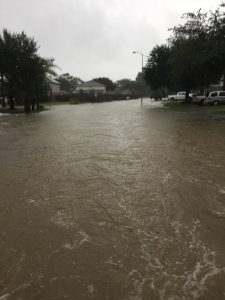
My heart goes out to all the victims and their families of Hurricane Harvey and I wish well to all those affected! If you did suffer a loss as a result of this disaster, you may be able to claim a casualty loss tax deduction.
You can elect to claim the loss in either of two years: the tax year in which the loss occurred (2017) or the immediately preceding year (2016). In order to determine the most beneficial year in which to claim the loss, you need to evaluate your tax situation for both years. The higher your marginal tax rate, the more valuable the casualty deduction is for you. One other consideration is how fast you want the refund. If you need help for paying for some of the restoration costs, you might consider claiming the deduction in 2016 . This allows you to get the refund from IRS before you even file your 2017 tax return.
What’s a casualty?
A “casualty” is the destruction of property from some sudden, unexpected, or unusual event. If you have progressive deterioration, for example, from pest infestation or a water leak, that does not qualify.
For more information about “casualty losses” see IRS Publication 547.
Casualty loss tax deduction for personal property
If you held the destroyed property for personal (nonbusiness) use, your casualty loss tax deduction is the lesser of (1) the decline in the property’s value or (2) your basis in the property (usually, its cost). You must further reduce this calculated loss by any salvage value or insurance proceeds you might have received.
Two additional tax rules apply before you can take the deduction. First, you must reduce the loss by a $100 “floor”. Second, you can claim the deduction only to the extent it (combined with any other casualty losses) exceeds 10% of your adjusted gross income (AGI).
To take a casualty loss tax deduction for personal property, you must itemize your deductions on Schedule A and complete Form 4684, Casualties and Thefts.
Casualty loss tax deduction for business property
If the disaster totally damaged your trade or business property, you can claim a loss equal to the property’s adjusted basis. This rule prevents your business from taking a casualty loss tax deduction for more than the depreciated value of the property.
If you held the property partly for personal use and partly for business use, you must treat it as two separate properties. You will have to allocate the loss appropriately.
How to deduct the personal property loss in 2016
If you have already filed your 2016 return, you may claim the casualty loss tax deduction by filing an amended return. You have until October 15, 2018, if you are a calendar year taxpayer, to amend your 2016 tax return to claim the casualty loss that occurred during 2017. If you filed an extension for 2016, you have until January 31, 2018 to file your 2016 tax return.
In both cases you must include a statement saying that you are making the election to deduct the loss in the preceding year. You can either make the statement on the return or you can file it with the return. You must include the name or a description of the disaster that gave rise to the loss, the date or dates of the disaster, and the city, town, county or parish, state, and ZIP code where the damaged or destroyed property was located at the time of the disaster.
To learn more about tax rules and regulations, request a free consultation or call us at 832-919-8448.